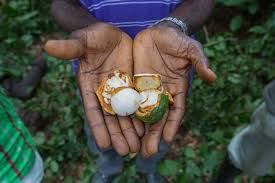The cola nut trade in Tamale, Northern Ghana’s regional capital, is facing a crisis as soaring prices and dwindling supplies are putting both traders and consumers under strain.
Once a reliable source of income, the cola nut business is now grappling with rising costs, largely driven by import dependencies and the depreciation of the Ghanaian cedi. A report by Graphic Business revealed that over the past year, cola nut prices have skyrocketed. A single cola nut, which previously sold for GH¢1, now costs GH¢5, while a bowl of 100 nuts has surged from GH¢60 to GH¢400.
Larger quantities are also seeing price hikes—a size 34 bucket has jumped from GH¢650 to GH¢1,500, and a full bag now ranges between GH¢3,000 and GH¢5,000, depending on the CFA exchange rate, as most imports come from Ivory Coast.
Cultural Significance In Northern Ghana, cola nuts hold deep cultural and social significance. They are essential in traditional ceremonies, including marriages, and symbolize respect and hospitality at social gatherings. Despite the price surge, demand remains due to their cultural importance.
Business Struggles Traders in Tamale are feeling the pressure, as many fear they may lose customers or even their livelihoods if prices continue to climb. Though consumers still buy cola nuts, sales have slowed, with traders attributing the price hikes to the cedi’s depreciation.
A long-time cola nut seller, Afa Mubarik, who has operated in Tamale’s central market for over 40 years, expressed concern about the industry’s over-reliance on imports. “The cedi depreciation is crippling our business. It directly increases import costs, forcing us to raise prices,” Mubarik explained.
Customer Concerns Hajia Fatima, a regular buyer, shared the difficulties consumers face. “Cola nuts are essential for our traditional ceremonies and daily use, but the prices keep rising. It’s becoming harder to afford, but I have no choice since my elderly mother relies on them,” she said.
Traders and consumers alike hope for government intervention to stabilize the cedi and support local businesses, which could help revive the cola nut trade.




